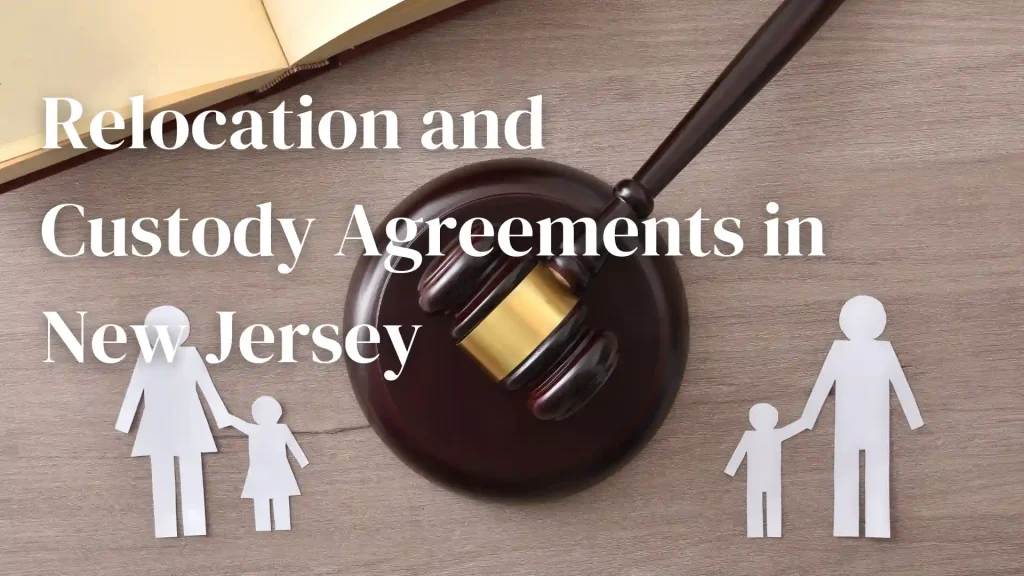 When divorced or separated parents share custody, relocating, especially out of state, can create serious legal complications. A parental move affects more than distance; it can impact parenting time, school choices, and a child’s emotional health. Understanding how New Jersey handles relocation and custody agreements is essential, whether planning a move or reacting to one. Suppose you’re thinking about moving and have to determine a custody arrangement. In that case, knowing how to handle relocation with a child custody agreement is essential to avoid legal setbacks and preserve your parenting time.”
When divorced or separated parents share custody, relocating, especially out of state, can create serious legal complications. A parental move affects more than distance; it can impact parenting time, school choices, and a child’s emotional health. Understanding how New Jersey handles relocation and custody agreements is essential, whether planning a move or reacting to one. Suppose you’re thinking about moving and have to determine a custody arrangement. In that case, knowing how to handle relocation with a child custody agreement is essential to avoid legal setbacks and preserve your parenting time.”
What Is Relocation in the Context of Custody?
Relocation refers to a parent’s attempt to move a child’s primary residence in a way that significantly disrupts the existing custody or visitation schedule. In New Jersey, how the law applies depends on whether the move is in-state or out-of-state and whether custody is sole or joint. Depending on how the move affects parenting time, even a parent with sole custody may need court approval or the other parent’s consent, especially when exploring co-parenting with an ex and trying to maintain a healthy balance for the child.
In joint custody cases, even a move just a few hours away can trigger a move-away custody dispute. These situations often arise when the proposed relocation makes it difficult to follow the current parenting plan. The parent not relocating may object to the change if it reduces their time with the child or complicates visitation logistics.
Courts in New Jersey focus on the child’s best interests, not the preferences of either parent. Better housing, job opportunities, or proximity to extended family may not be enough to justify a move. The relocating parent must show that the move benefits the child while allowing the other parent to maintain a meaningful relationship. Legal guidance is often essential in these cases.
Legal Requirements for Relocation with a Child
New Jersey law changed significantly after the 2017 Bisbing v. Bisbing ruling. A parent seeking to relocate must prove that the move is in the child’s best interests, regardless of custody arrangements. Previously, custodial parents had more freedom to move if they acted in good faith and offered a legitimate reason.
To relocate legally, a parent must either:
- Obtain written consent from the other parent
- File a motion for court approval to relocate the child
This process often includes a relocation hearing where each side presents arguments and evidence. Judges evaluate a wide range of factors, including:
- The child’s relationship with each parent
- Educational, emotional, and social impact
- The feasibility of a long-distance parenting plan
- History of domestic violence or parental fitness
- The child’s preferences, if they are mature enough
Parents cannot relocate independently and then seek approval after the fact. Courts take unauthorized relocation seriously and may modify custody arrangements in response.
What Happens If Parents Can’t Agree?
When parents disagree on relocation, the family court steps in. This usually results in a family law relocation dispute involving mediation or litigation.
Courts do not favor one parent over the other. Instead, they aim to preserve the child’s bond with both parents while promoting a stable environment. In contested cases, judges often appoint guardians ad litem or custody evaluators to make independent assessments.
If the court approves relocation, custody may be modified to reflect the new logistics. In some cases, courts have granted primary custody to the parent remaining in New Jersey to maintain continuity in the child’s life.
Modifying Custody and Visitation After a Relocation Request
 If one parent wants to move, both parents may need to revisit their custody and visitation agreements. This may involve negotiating a new parenting plan relocation notice, particularly when a move disrupts regular weekend or weekday visits.
If one parent wants to move, both parents may need to revisit their custody and visitation agreements. This may involve negotiating a new parenting plan relocation notice, particularly when a move disrupts regular weekend or weekday visits.
For instance, an out-of-state move might mean:
- Longer but less frequent visits (e.g., holidays, summer break)
- Virtual visitation schedules
- Adjusted pickup/drop-off responsibilities
- Travel cost allocations
If the non-relocating parent disagrees with the proposed terms, they can object and request a custody modification or visitation. The judge will weigh whether modifying the parenting time or custody structure better supports the child’s stability and determine child support.
A relocation clause in the custody order can influence how easily modifications are granted. These clauses often outline advance notice periods or restrictions on moving outside a designated radius.
Talk to a New Jersey Custody Attorney Before Making a Move
Relocation cases are complex and depend on each family’s circumstances, especially after the Bisbing decision.
The Law Office of Andrew A. Bestafka, Esq. helps parents in Freehold and nearby areas protect their custody rights during relocation disputes. Whether negotiating parenting plans or representing clients in court, the team provides clear legal guidance.
Our team is here to help you understand your rights and take the first step toward securing the necessary benefits. Call us at (732) 898-2378 or contact us online for a consultation with our child custody lawyer in New Jersey to learn more.
